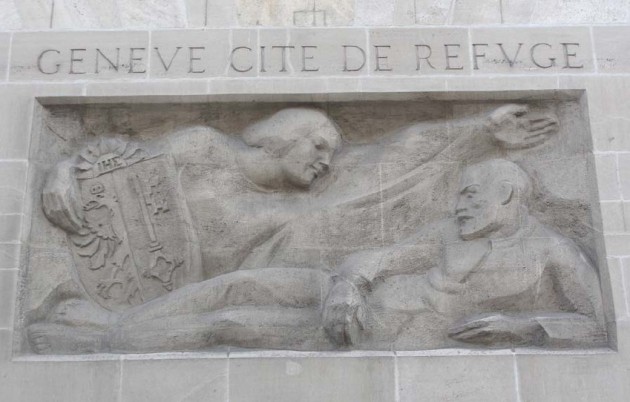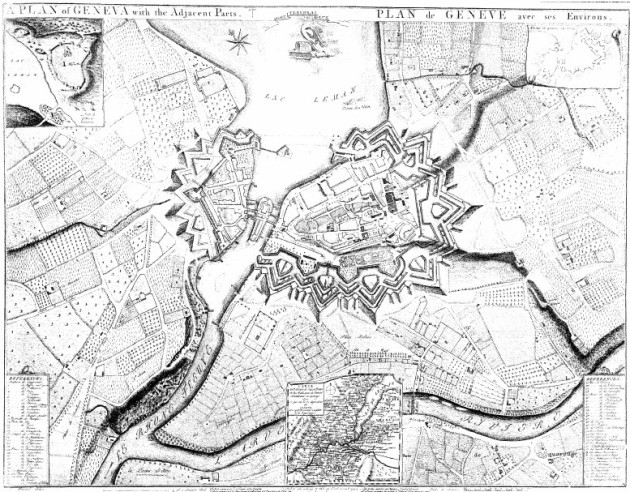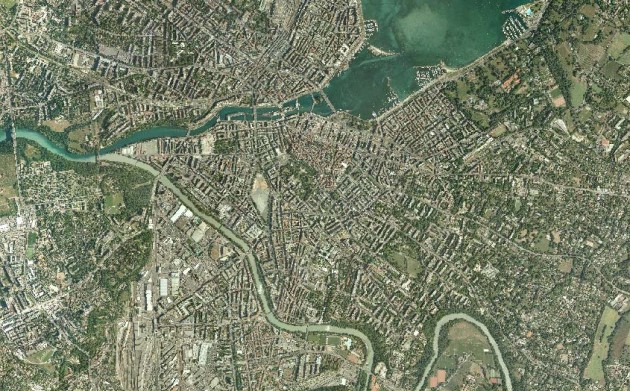The construction of a Genevan identity
Some Swiss historians, such as Johann Kapsar Mörikofe[1] in his History of Reformed Refugees in Switzerland (1887) weave these themes (the Huguenot, champion of the faith and of liberty, xenophobia induced by the refugee workforce, Switzerland as a safe haven) in their effort to put together an account of the origins of the nation. Prominent among them is the third theme, which accounts for the inception of a mythical entity : Geneva the « city of Refuge »
, taking over from the « Citadel of the Reformation »
and a portent of the « capital of Human Rights »
, headquarters of humanitarian efforts, shrine of the dialogue between the nations and of international conventions. The symbolic centre of the city, Place du Molard, which was and remains one of the main gateway to the old city, boasts since 1920 a low-relief inscribed « Geneva, City of Refuge »
. Like all other myths, this one relies on historical facts freely interpreted by pen-wielding elites and popular oral traditions. Become a building bloc of the national identity, it pervades mindsets to the point of influencing social and political practices.
The myth of the « International vocation of Geneva »
was built stage by stage. There is no doubt that it was the Reformation that, in 1536, bestowed on Geneva its reputation as a major European centre, although the city had been an important trade fair centre in the Middle Ages. In the 16th century the city grew on what Protestants arriving from other places brought with them as they joined in its religious and political life ; their most prestigious representative was Jean Calvin[2]. Historians have been able to trace the development of a Genevan myth right back to those days. Alain Dufour finds it in images such as « Geneva, city & church, exemplar of Calvinism »
. He notes that the word ‘Geneva' may in those days have been used to describe a theological concept, like in the phrase « Geneva heresy »
. The myth was shaped both by the champions of the Reformation and by its detractors, with the latter providing a counter-myth in which Geneva was a den of iniquity. So Geneva was the capital city of the French-speaking Reformation ; in the Protestant world, the custodian of orthodoxy and guiding light of Reformed churches, it wielded an « undisputed moral authority »
This image faded into another around the end of the 17th and the beginning of the 18thcentury. The loosening of strict Calvinism was met with mistrust, nay condemnation, notably in the Churches of the Refuge. A less intransigent theology was being developed : a foretaste of the next century's liberal theology, it did not enlist unanimous support among Protestants. With this evolution, Geneva had to, and indeed was able to find a new role. There was a shift in the image the republic gave of itself : it became the capital city of theological and political freedom. In the 18th century, and even more so in the 19th, the Genevans defined their city as the ‘outpost of enlightenment and a bastion of liberty'. Jean-Jacques Rousseau[3] was a Genevan citizen and Voltaire[4] would live there for a while before settling in nearby Ferney. The « Geneva »
article in d'Alembert[5]'s Encyclopaedia bears out this new image of the city. We have here the picture of a city both Protestant and guarantor of freedom of thought with an enlightened form of Government. This image did not stop the Republic's authorities from banishing Rousseau or from having two of his books – Émile and the Social Contract – burnt in 1762.
The 19th century broke with the religious tradition and forces a reconstruction of the national history. After a revolutionary flare-up, the Napoleonic era crushed Genevan independence and altered forever the old Protestant republic. In 1814, the Restoration in France brought with it the return of Geneva to Switzerland, which entailed the adjunction to Geneva of Savoyard communes, French therefore Catholic. Geneva thus became a mixed faith Swiss canton. Between 1846 and 1850, with the introduction of universal suffrage for men the Canton went through a democratic revolution. The walls that had protected the town for centuries were pulled down. From 1860 onwards, the Catholics slightly outnumbered the Protestants. This new demographic balance was attended by a new-found identity driven by a speedy reworking of the historiography. The object was to develop histories capable of « reinstating continuity into the present »
as François Hartog puts it. The outstanding question was : how is Geneva's specific, mythical identity and its link to Protestantism to be preserved whilst including the new Catholic populations and adjusting to European secularisation ?
In this quest, the Refuge became altogether the origin, the cause of and the evidence for a vocation to give shelter inherent to Geneva's very nature ; and the refugee on grounds of creed became the prototype for the refugee on ideological grounds, and ultimately for the stranger finding a home in Geneva, pluralist ‘city of Refuge'. The shift is significant. 16th and 17th century refugees were supported or integrated conditionally, because of their Protestantism : a duty towards brothers and sisters in the faith had to be fulfilled. In the 19th century, the admission of refugees became for Geneva a mission in its own right and this paved the way for a vocation for peace and human rights. This reframing rested on two rationales. Historians and thinkers at the time, whether liberal or not, viewed the Reformation as the ideological revolution that introduced Europe to the concepts of individual freedom and the imperative of a personal quest for truth. Geneva was then considered the capital of this idea of liberty, and thus as a place of refuge for anyone become the object of ideological persecution. Thereafter this interpretation was brought to the fore to meet the superior necessity pushing the Genevans to conjure up a national memory that would admit of religious pluralism. Put another way, the Genevan myth had been secularised. The Protestant Rome, Calvin's city became the capital of the idea of liberty and fraternity, two ideas that may arguably be traced back to the Reformation but that were much more in tune with modernity's secularised world.
At the beginning of the 20th century, this historiography yielded a philosophical narrative : the talk is of the « spirit of Geneva »
. According to Robert de Traz, who published a treatise on the subject in 1929, this philosophy is the wellspring of the work of the Red Cross, founded in 1862 after an idea of Genevan Henri Dunant[6], and of the League of Nations, the forerunner to the United Nations, which took its quarters in Geneva in 1920. Robert de Traz's text sets down a genealogy : Geneva was a trade fair centre, then the city of Calvin and city of the Refuge, it grew into an enlightened Republic with Rousseau, then the capital nay the symbol – of a universal idea spreading about the whole world, and where international organisations naturally have their place. This historiography, which sets the refugee at the heart of the nation still prevails today. The history pages of Geneva's website are based on these premises. What they do not say is that since 1945, these very international civil servants, working for the United Nations, the International Labour Organisation and in the numerous other international organisations based in Geneva are regularly accused by Genevans of plundering their resources, causing inflation or causing housing shortages : the latest illustration of the dichotomy between a simplified self-image and the complexity of hard facts.











